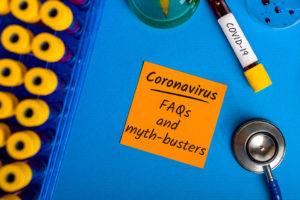COVID-19: separating facts from fiction
April 1, 2020 • Uncategorized
 Finding the truth has never been more important than in the current times, when people are searching news reports, social media and other resources for COVID-19 advice and information that might help in protecting their health and saving lives, says HSC researcher Erika Thompson, PhD, MPH, Assistant Professor of Health Behavior and Health Systems and Director of the School of Public Health Maternal and Child Health MPH program.
Finding the truth has never been more important than in the current times, when people are searching news reports, social media and other resources for COVID-19 advice and information that might help in protecting their health and saving lives, says HSC researcher Erika Thompson, PhD, MPH, Assistant Professor of Health Behavior and Health Systems and Director of the School of Public Health Maternal and Child Health MPH program.
For years, Dr. Thompson has studied the effects of misinformation related to children’s immunizations and the HPV vaccine. Misleading suggestions and false claims incorrectly promoted as legitimate news have led people to make decisions detrimental to their health and the safety of their families and communities.
Now, Dr. Thompson and other public health scientists are seeing similarities in many types of COVID-19 recommendations and social media links being shared among groups in well-meaning but misinformed online posts.
“It seems we are all on overload right now, searching for the most up-to-the-minute coronavirus information we can find,” Dr. Thompson said, “but who do you trust and how can you verify that what you’re reading, hearing or seeing is fact-based and truly accurate?”
It is especially in times like these, she stresses, that placing your trust in evidence-based information is critical to taking care of our population’s health and well being.
“Many of us have seen stories on our newsfeed about how to hold your breath to determine if you have coronavirus, how to avoid catching the disease by taking a hot bath or spraying yourself with alcohol or chlorine, and other myths like that,” she said, “but before trusting those types of suggestions, people should first take a step back to verify the sources of the information.”
That means looking to reputable sources like the CDC, World Health Organization (WHO), your local public health department and personal health providers for guidance, as well as educational, medical, scholarly and federal government agency resources.
HSC’s SaferCare Texas, dedicated to improving the quality and safety of healthcare and serving as a resource for professional and community education, is so concerned about online misinformation that a section of the department’s website is focused on teens, one of the largest active social media user groups today, who researchers say have doubts regarding how to verify truth and accuracy in the information they find online.
Studies have found that 70% of youth use the internet as their first source of health information, and SaferCare Texas has taken steps to give educators, librarians and other community members tools to help teens distinguish reliable from unreliable resources through a program called WebLitLegit. The program’s slogan is “Know Truth from Trash.”
“All of us, at any age, should be working hard right now on our health literacy skills to find, understand and apply health information on the COVID-19 pandemic in a way that grounds us to truth and accuracy,” Dr. Thompson said. “We are constantly bombarded with information during this public health crisis, and while it’s easy to be lured into the flashiest or most interesting story, it’s incredibly important to get to the true facts to guide us.”
Based on her research regarding parent internet verification skills related to vaccines and immunizations, Dr. Thompson offers these suggestions for fact-checking online information:
- Check to see if the information is up-to-date.
- Ask yourself if the information is complete and includes all you need to know.
- Consider whether the writer is giving facts or opinions.
- Check other resources to see if the information can be verified.
- Consider why the author posted the information and who owns the website. Is there contact information? What is the author’s expertise on the topic, or qualifications of those being quoted in the story? What other types of information can be found on the site?
- Seek recommendations from reliable others you know, like your health provider, the CDC, or WHO.
- View different resources to give yourself a broad perspective of news and information.
- Consider consequences before taking action. Guidance like “wash your hands” follows basic good recommendations we’ve all been taught before and helps, not endangers, your health. Trying something risky and unknown, like the elderly Arizona couple that ingested a poisonous substance from fish treatment as an attempted COVID-19 preventive measure, has the potential for very serious, even deadly, results.
- For a list of common COVID-19 myths, visit the WHO public health mythbusters website to check facts versus fiction.
“Verification skills are important for any health concern, but in a time like this where information is constantly changing, it is incredibly important to be sure you are relying on facts you can trust,” Dr. Thompson said. “It’s critical to our individual health, the health of our families and friends, and our world.”

Social media